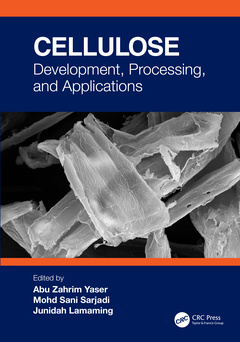Cellulose Development, Processing, and Applications
Coordonnateurs : Yaser Abu Zahrim, Sarjadi Mohd Sani, Lamaming Junidah

Cellulose: Development, Processing, and Applications covers topics related to advanced cellulose development and processing, as well as the utilization of major agricultural and biomass waste. It discusses the utilization of cellulose from other agricultural and biomass materials, including oil palm biomass, bamboo, and other non-wood forest products in emerging areas. It covers the treatments used to improve the quality of cellulosic materials in specific applications. Following that, the book delves into the use of cellulosic materials in the application of composting science and technology.
Features:
- Delves into the specific agriculture waste/biomass waste materials used for the advanced cellulose-based production
- Outlines the potential use of the covered materials for energy production and other emerging applications
- Includes composting technology and processes using the cellulosic materials
- Overviews industrial applications of cellulose from agricultural waste/biomass waste and composting technology
- Discusses the main agricultural waste/biomass in the Asian region
This book is aimed at researchers and graduate students in chemical engineering, bioprocessing, composites, and biotechnology.
Chapter 1. Introduction
Chapter 2. A Brief Overview of the Use of Bamboo Biomass in the Asian Region’s Energy Production
Chapter 3. Pre-treatment of Oil Palm Empty Fruit Bunches with Sea Water Improves the Qualities of Lignocellulose Biomass
Chapter 4. Biorefinery of Biofuel Production: Thermochemical and Biochemical Technologies from Renewable Resources
Chapter 5. Review on the Current Updates on Palm Oil Industry and its Biomass Recycling to Fertilizer in Malaysia
Chapter 6. Wastewater as Nutrient Enhancer and Moisturizer for Compost Production: A Review
Chapter 7. Biocomposites as Structural Components in Various Application
Chapter 8. Natural Fiber Composites for Automotive Applications
Chapter 9. Influence of Cellulose Nanocrystals from Agro Residues as Reinforcing Agent for Cement Composites
Chapter 10. All-Cellulose Composites: Processing, Properties, and Applications
Chapter 11. Cellulose-Based Bioadhesive for Wood-Based Composite Applications
Chapter 12. Deriving Renewable Feedstock from Palm Oil Mill Effluent for Polyhydroxyalkanoate (PHA) Production
Chapter 13. Recent Developments in Pre-Treatment and Nanocellulose Production from Lignocellulosic Materials
Chapter 14. Characteristics of Cellulose Nanocrystals from Sugarcane Bagasse Isolated from Various Methods: A Review
Chapter 15. Applications of Regenerated Cellulose Products
Chapter 16. Developments and Application of Nanocellulose-Based Hydrogels in the Biomedical Field
Chapter 17. Overview of Cellulose Fiber as Materials for Paper Production
Chapter 18. Challenges and State of the Art of Allium Pulp Development for Paper Making: A Brief Review
Chapter 19. Application of Cellulose in Leather
Chapter 20. Utilization of Cellulose in Wastewater Treatment
Chapter 21. Comparing Properties and Potential of Pinewood, Dried Tofu and Oil Palm Empty Fruit Bunch (EFB) Pellet as Cat Litter
Chapter 22. Challenges and Future Perspectives
Abu Zahrim Yaser, PhD is an Associate Professor in Waste Processing Technology at the Faculty of Engineering, Universiti Malaysia Sabah, Malaysia. He obtained his PhD from Swansea University. He has published 12 books and more than 100 other publications. His inventions in the composting systems have been adopted by Tongod and Nabawan districts in Sabah. He is the co-chair for Kundasang's Community Composting Site, a site dedicated for vegetable waste composting. He is a visiting scientist at the University of Hull.
Mohd Sani Sarjadi, PhD is currently an Associate Professor in Industrial Chemistry in the Faculty of Science and Natural Resources, Universiti Malaysia Sabah. His PhD was awarded in 2015 and obtained from the University of Sheffield, United Kingdom. His research interests include organic synthesis, polymer chemistry and all aspects of industrial chemistry. He had published numerous articles in local and international refereed journals and conference proceedings. He is an Associate Member of the Royal Society of Chemistry, United Kingdom (Chartered Chemist); Associate Member of the Malaysian Institute of Chemistry; and Professional Technologist (Material Science Technology), Malaysia Board of Technologists.
Junidah Lamaming, PhD is currently a fellow researcher at Faculty of Engineering, Universiti Malaysia Sabah. She obtained her PhD in 2016 in the field of nanocellulose and nanofiber science and technology from Universiti Sains Malaysia, Malaysia. She was rewarded an IAAM Scientist Award from International Association of Advanced Materials. Her research interests include nanocellulose fiber and applications, polymer blends, reinforced/filled polymer composites, characterization and production of lignocellulose-based composites and fire-retardants, bioadhesives and biopolymers using sustainable methods. Over the years, she has published articles in a significant number of high impact jour
Date de parution : 09-2023
17.8x25.4 cm
Thèmes de Cellulose :
Mots-clés :
Compost; Composites; Lignocellulose; Biomass; Agro Residue; Wastewater; Cellulose Nanocrystal; Moisture Content; Lignocellulosic Biomass; Bamboo Biomass; Pome; Oil Palm Biomass; Oil Palm; CNF; Papermaking Processes; CNW; RTM; Sulfuric Acid Concentration; Natural Fiber; Cellulose Fibers; Oil Palm Empty Fruit Bunch; Palm Oil Waste; Lignocellulosic Materials; Natural Fiber Composites; Compression Molding; EFB; Cupriavidus Necator; Oil Palm Leaves; FFB; Cellulosic Material; Palm Oil Mill



